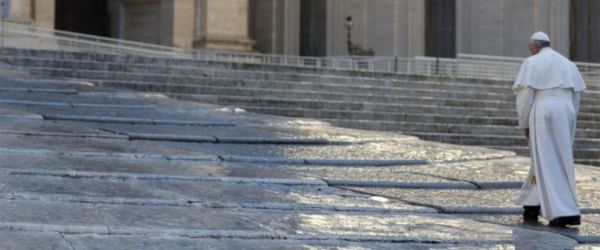God is always at work out of love and it is up to us to respond to him with responsibility and in a spirit of reconciliation, leaving room for the Holy Spirit. This was the invitation addressed by the Pope in the Mass celebrated Monday morning, 9 February, in the chapel of the Casa Santa Marta.
"Today's liturgy of the Word," Francis explained immediately, referring to the passage from Genesis (1:1-19), "leads us to think, to meditate on God's workings: God works". So much so that "Jesus himself said: 'My Father still works, still acts, still works; me too!". And so, the Pope recalled, "some medieval theologians explained: first God, the Creator, creates the universe, creates the heavens, the earth, the living. He creates. The work of creation'. However, 'creation does not end: He continually sustains what He has created, He works to sustain what He has created so that it goes on'.
Precisely in Mark's Gospel (6:53-56), the Pope noted, "we see God's 'other creation'" that is, "that of Jesus who comes to 're-create' what had been ruined by sin". And "we see Jesus among the people". In fact, Mark writes: "When he got out of the boat, the people immediately recognised him and flocked from all over the region and began to bring the sick to him on stretchers, wherever they heard he was; and those who touched him were saved". It is "the 're-creation'", precisely, and "the liturgy expresses the soul of the Church in this, when it makes us say in a beautiful prayer: 'Oh God, who so marvellously created the universe, but more marvellously recreated it in redemption'". So 'this "second creation" is more wonderful than the first, this second work is more wonderful'.
There is then, Francis continued, "another work: the work of perseverance in the faith, which Jesus says is done by the Holy Spirit: 'I will send you the Paraclete and He will teach you and make you remember what I have said'". It is "the work of the Spirit within us, to make Jesus' word alive, to preserve creation, to ensure that this creation does not fail". So "the presence of the Spirit there, making the first creation and the second creation alive".
In short, 'God works, continues to work, and we can ask ourselves how we are to respond to this creation of God, which was born out of love because He works out of love'. Thus "to the 'first creation' we must respond with the responsibility that the Lord gives us: 'The earth is yours, bring it forth; make it grow!'". Therefore "for us too there is the responsibility to make the earth grow, to make creation grow, to guard it and make it grow according to its laws: we are lords of creation, not masters". And we must not 'take possession of creation, but make it grow, faithful to its laws'. Precisely "this is the first response to God's work: to work to care for creation, to make it bear fruit".
In this perspective, the Pope argued, 'when we hear that people hold meetings to think about how to guard creation, we can say: "But no, it's the greens!"'. Instead, he relaunched, "it is not the greens: this is Christian!". And "it is our response to God's 'first creation', it is our responsibility!". In fact, "a Christian who does not care for creation, who does not make it grow, is a Christian who does not care for God's work, that work born of God's love for us". And "this is the first response to the first creation: to guard creation, to make it grow".
But "to the 'second creation', how do we respond?" asked Francis, noting that, in this regard, "the Apostle Paul tells us a right word, which is the true response: 'Let yourselves be reconciled with God'". It is, he explained, 'that open interior attitude to go continuously on the road of interior reconciliation, of communal reconciliation, because reconciliation is the work of Christ'. And Paul goes on to say: 'God has reconciled the world in Christ'. And "this is the second answer". So "to the 'second creation' we say: 'Yes, we must allow ourselves to be reconciled with the Lord'".
Francis then proposed another question: "And to the work that the Holy Spirit does in us, of reminding us of Jesus' words, of explaining to us, of making us understand what Jesus said, how do we respond?" It was "Paul who told us" not to grieve "the Holy Spirit who is in you: be careful, he is your host, he is within you, he is working within you! Do not grieve the Holy Spirit". And this "because we believe in a personal God. God is person: he is person Father, person Son and person Holy Spirit'. Moreover, "all three are involved in this creation, in this recreation, in this perseverance in re-creation". So "to all three we respond: to guard and make creation grow, let us be reconciled with Jesus, with God in Jesus, in Christ, every day, and do not grieve the Holy Spirit, do not chase him away: he is the guest of our heart, the one who accompanies us, who makes us grow".
In conclusion, the Pope prayed that "the Lord will give us the grace to understand that He is at work; and give us the grace to respond rightly to this work of love."
[Pope Francis, St. Martha, in L'Osservatore Romano 10/02/2015]












